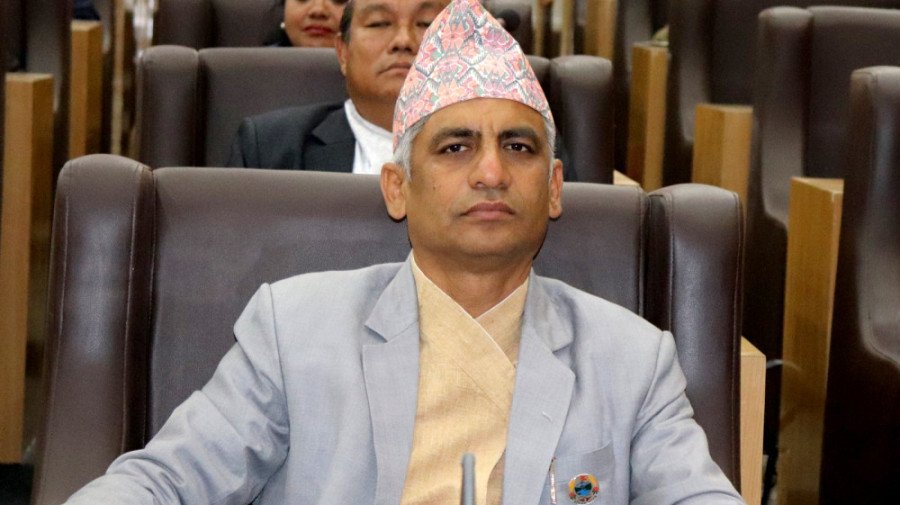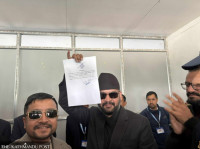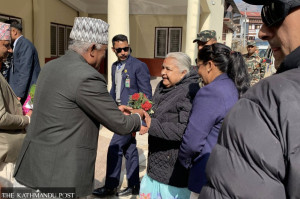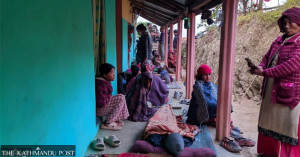Koshi Province
Koshi chief minister Karki refuses to quit, dismisses need for floor test
As per a March 4 deal, a UML leader is supposed to become the new chief minister.
Purushottam Poudel
The deadline given by the Provincial Assembly to Koshi chief minister Kedar Karki to either seek a vote of confidence or resign expired on Tuesday. The assembly had given Karki a month (counting from the day the coalition partners withdrew their support) to take a decision.
The change in the federal coalition on March 4, with the CPN-UML taking the place of the Nepali Congress in the ruling alliance, changed the power equation in the provincial government and Karki lost his majority in the provincial assembly.
Karki, a leader of the dissident faction of the Congress, was appointed chief minister with the support of the UML on October 14. Later, he also got the support of the establishment (Deuba) faction of the Congress, the CPN (Maoist Centre), the CPN (Unified Socialist) and the Janata Samajbadi Party.
On April 8, both the UML and the Maoist Centre officially announced the withdrawal of their support to the Karki government. Subsequently, on April 19, the special session of the provincial assembly passed a resolution instructing the chief minister to seek a vote of confidence within 30 days of losing the majority or resign from the post. The deadline expired Tuesday.
Article 188 (2) of the constitution also suggests the chief minister needs to take a vote of confidence within the 30 days if the coalition partners withdraw their support.
However, chief minister Karki remains steadfast in his refusal to either seek a floor test or resign, thereby complicating the provincial government’s position.
Karki argues that the present government was formed based on Article 168 (5) of the constitution and not Article 168 (2) and that there is no need for him to go for a floor test if he believes that he has a majority in the assembly.
“I have already proven my majority in the assembly, and the chief minister need not prove his majority time and again,” Karki told the Post.
He further argues that the current provincial government was formed with the support of individual assembly members, and no specific party was involved in appointing the chief minister.
He claims that only the chief minister appointed under Article 168 (2) of the constitution needs to prove his majority if there is doubt.
Under Article 168 (2), the Provincial Head appoints as chief minister the leader of a party which can secure a majority in the assembly. If no party can secure a majority, individual assembly members, irrespective of their party, can support a candidate of their choice for chief minister as per Article 168 (5) of the constitution.
Karki also claims that the government he leads is based on the latter constitutional provision.
“This government was formed to prevent the province from going to snap election,” Karki told the Post. “Therefore, in order to forestall a midterm election, I should not resign as the chief minister.”
However, constitutional experts contest Karki’s claims and argue that his assertion contradicts constitutional provisions.
The provisions on the formation of the federal and provincial governments are similar, experts say.
“The chief minister needs to seek a vote of confidence both while forming a government as well as in the event of withdrawal of support by coalition partners,” advocate Bhimarjun Acharya told the Post.
Karki, who revolted within his party Congress after it decided to support Indra Bahadur Angbo of the Maoist Centre for chief minister, landed chief ministership with the backing of the UML and the Shekhar Koirala faction of the Congress. Karki had the backing of 48 lawmakers in the 93-member assembly. While the 40 UML assembly members voted for Karki, eight votes came from Congress provincial assembly members.
Despite helping Karki, the UML, which was in the opposition, did not join the provincial government after the then ruling coalition members later extended their support to the chief minister.
Hikmat Karki, the UML’s parliamentary party leader in the assembly who is waiting in the wings to become new chief minister, said Karki should either seek a floor test or quit.
As per the agreement among the parties in the new federal coalition formed on March 4, the UML will get the chief ministerial position of the province.
“Chief Minister Karki who has lost majority in the provincial assembly is showing anti-political character by refusing to resign,” Karki told the Post. “We expect the Provincial Head to take necessary steps as the deadline to seek the vote of confidence or resign from the post ended on Tuesday.”
The ruling coalition has a total of 58 seats in the 93-member assembly. The UML, with 40 seats, is the largest party. Another coalition partner, the Maoist Centre has 13 seats, while the Unified Socialist has four seats. In the 93-member assembly, a candidate needs 47 seats to prove a majority. The Congress currently has 29 seats and cannot muster a majority even with the support of the Rastriya Prajatantra Party, which has six seats in the provincial assembly.




 9.12°C Kathmandu
9.12°C Kathmandu















